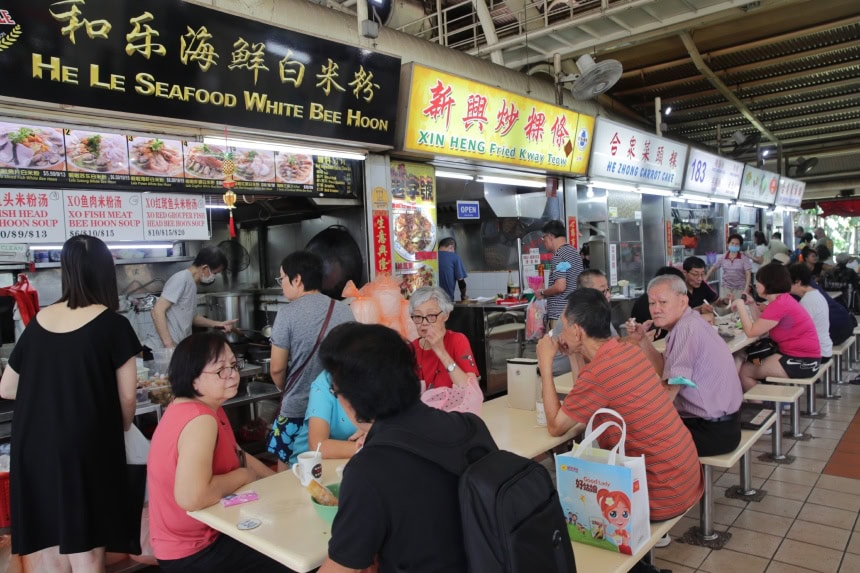
SINGAPORE – From Jan 1, 2025, hawker stallholders will be able to hire from a larger pool of long-term visit pass holders in a move to mitigate rising manpower costs, Senior Minister of State for Sustainability and the Environment Koh Poh Koon told Parliament on Oct 14.
Holders of these passes will need letters of consent or pre-approved letters to work as stall assistants, Dr Koh added.
“This will provide our hawkers with more hiring options while still largely preserving the local identity of our hawker culture,” said the National Environment Agency (NEA) in a statement.
At present, only Singapore citizens and permanent residents can be stallholders or work as stall assistants in the 121 hawker centres and markets managed by NEA and its operators. Stallholders’ spouses who are holders of long-term visit passes are also currently allowed to work as stall assistants.
But with the rule change, long-term visit pass holders need not be spouses to work as stall assistants. They could be parents or children.
They could also be unrelated to the stallholder. These pass holders are given residency of up to two years on their first application.
At the same time, long-term visit pass-plus holders will also be eligible to plug the manpower needs of hawkers. These foreigners, who are allowed to stay longer for up to three years on their first application, will also have healthcare and employment benefits.
More details will be released in the coming months.
Dr Koh said: “We are also studying other support measures for hawkers and will share the details when ready.”
He was responding to labour MP Melvin Yong (Radin Mas) who had asked about the median rent for recently tendered stalls, and whether NEA plans to review the duration of initial tenancy to discourage disproportionately high rental bids.
Past surveys showed that manpower costs – at 20 per cent – have traditionally been the second-highest expenditure item for stallholders after raw materials at 56 per cent, said NEA. Stall rental makes up less than 10 per cent of operating costs.
To support hawkers grappling with manpower issues, NEA has two productivity programmes and grants in place. Under the Productive Hawker Centres Programme, subsidies are given to stallholders where a centralised dishwashing service is used.
The Hawkers’ Productivity Grant helps stallholders buy automation technologies to improve work processes.
Progress Singapore Party Non-Constituency MP Leong Mun Wai asked if existing work permit holders such as migrant workers would also be allowed to work at hawker centres since they can do so now in foodcourts and coffee shops. That is not in the plan at the moment, said Dr Koh.
The rental cost of hawker stalls also came under the spotlight lately when a stall at Marine Parade Central Market and Food Centre had a bid of $10,158. Five stalls at the hawker centre crossed a tender price of $8,000, which raised questions in Parliament about food affordability in September.
Dr Koh said then that such tender prices are not the norm. He added that NEA disallows the subletting of hawker stalls to prevent stallholders from engaging in rent-seeking behaviour.
On Oct 14, he said: “NEA is reviewing relevant policies at hawker centres to ensure that the system remains effective while keeping hawker food affordable.”
Mr Yong also asked whether a ballot model at a fixed rental rate has been considered for the tender process.
Dr Koh added that since 2012, NEA has removed reserve rent and does not set a minimum bid price for hawker stall tenders.
“As such, tenderers can secure stalls at lower-than-market rent for the first tenancy term. This would not be attainable under a model where stalls are allocated at fixed rental rates,” he added.
About one in five cooked food stalls was awarded at tender prices at or below $500 a month in 2023. The median tender price for food stalls across hawker centres was about $2,000 in 2022 and $1,800 in 2023.
Mr Yong asked whether the tender process could be tweaked to guide prospective hawkers to be more realistic with bids, saying that when one stall raises food prices, other stalls do the same.
Replying, Dr Koh said NEA will look into putting out more information on its website to help potential bidders know the price points they are competing against within the same hawker centre. But some competition must be allowed.
A stallholder has to ensure that his rental takes into account what consumers are willing to pay for food to keep his business viable. “He would then have to be a bit more moderate about what kind of price he wants to bid for a stall,” Dr Koh added.
SOURCE
Work Pass | Work Permit | S Pass | Employment Pass | Dependant Pass | Long Term Visit Pass | Letter Of Consent